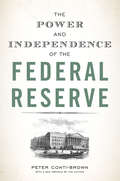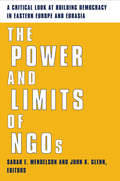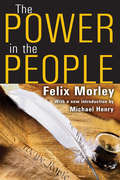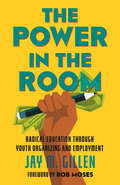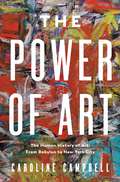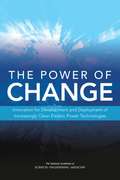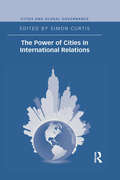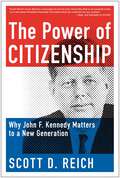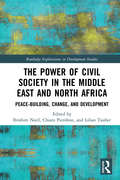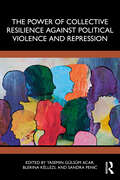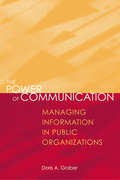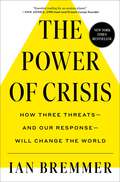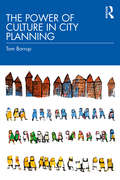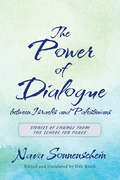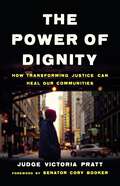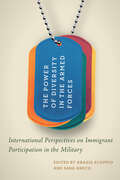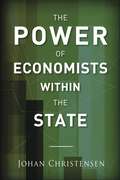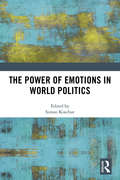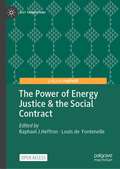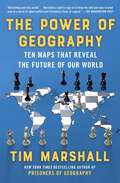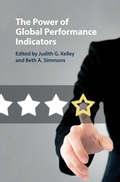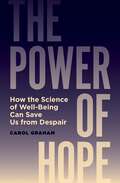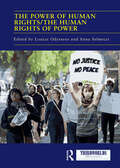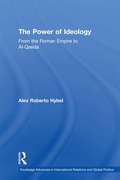- Table View
- List View
The Power and Independence of the Federal Reserve
by Peter Conti-BrownThe independence of the Federal Reserve is considered a cornerstone of its identity, crucial for keeping monetary policy decisions free of electoral politics. But do we really understand what is meant by "Federal Reserve independence"? Using scores of examples from the Fed's rich history, The Power and Independence of the Federal Reserve shows that much common wisdom about the nation's central bank is inaccurate. Legal scholar and financial historian Peter Conti-Brown provides an in-depth look at the Fed's place in government, its internal governance structure, and its relationships to such individuals and groups as the president, Congress, economists, and bankers. Exploring how the Fed regulates the global economy and handles its own internal politics, and how the law does—and does not—define the Fed's power, Conti-Brown captures and clarifies the central bank's defining complexities. He examines the foundations of the Federal Reserve Act of 1913, which established a system of central banks, and the ways that subsequent generations have redefined the organization. Challenging the notion that the Fed Chair controls the organization as an all-powerful technocrat, he explains how institutions and individuals—within and outside of government—shape Fed policy. Conti-Brown demonstrates that the evolving mission of the Fed—including systemic risk regulation, wider bank supervision, and as a guardian against inflation and deflation—requires a reevaluation of the very way the nation's central bank is structured. Investigating how the Fed influences and is influenced by ideologies, personalities, law, and history, The Power and Independence of the Federal Reserve offers a uniquely clear and timely picture of one of the most important institutions in the United States and the world.
The Power and Limits of NGOs: A Critical Look at Building Democracy in Eastern Europe and Eurasia
by John Glenn Sarah MendelsonSince the end of the Cold War, a virtual army of nongovernmental organizations (NGOs) from the United States, Britain, Germany, and elsewhere in Europe have flocked to Central and Eastern Europe and Eurasia. These NGOs are working on such diverse tasks as helping to establish competitive political parties, elections, and independent media, as well as trying to reduce ethnic conflict.This important book is among the few efforts to assess the impact of these international efforts to build democratic institutions. The case studies presented here provide a portrait of the mechanisms by which ideas commonly associated with democratic states have evolved in formerly communist states, revealing conditions that help as well as hurt the process.
The Power in the People
by Felix MorleyThe United States of America was established with lofty moral goals and noble purpose; it was believed that a government based on these ethical principles was the proper way to realize liberty and freedom. As the country continues to grow, from the days of the colonies to the influential nation that it is today, the governmental structure has grown and developed along with it into a unique type of government that profoundly affects the lives of the American people.Power in the People presents a detailed analysis of not only the origins of democracy, development and operation of government, and evolution of the country, but also a penetrating look into the character and purpose of the republic. Morley focuses on the founding of American freedom in the conviction that the individual is fully capable of self-government, and therefore power must be dispersed as much as possible among the individual citizens who generate public order from the internal order of their own souls. The power in the people is precisely that of self-government, which minimizes the need for state power, and the self-government is necessarily under the authority of God.The dream of building a commonwealth more gracious than any that had gone before was ever in the minds of the founding fathers and reflected in their act of placing great power in the hands of the citizens. Michael Henry's new introduction to this classic book places the work into the context of contemporary society, most poignantly noting that America, by Morley's standards, has not been vigilant enough in preserving its historic greatness or freedom.
The Power in the Room: Radical Education Through Youth Organizing and Employment
by Jay GillenHow community-centered, peer-to-peer, youth knowledge exchanges are evolving into a strong economic and political foundation on which to build radical public education.Following in the rich traditions in African American cooperative economic and educational thought, teacher-organizer Jay Gillen describes the Baltimore Algebra Project (BAP) as a youth-run cooperative enterprise in which young people direct their peers' and their own learning for a wage. BAP and similar enterprises are creating an educational network of empowered, employed students.Gillen argues that this is a proactive political, economic, and educational structure that builds relationships among and between students and their communities. It's a structure that meets communal needs--material and social, economic and political--both now and in the future. Through the story of the Baltimore Algebra Project, readers will learn why youth employment is a priority, how to develop democratic norms and cultures, how to foster positive community roles for 20-30 year-olds, and how to implement educational accountability from below.
The Power of American Governors
by Thad Kousser Justin H. PhillipsWith limited authority over state lawmaking, but ultimate responsibility for the performance of government, how effective are governors in moving their programs through the legislature? This book advances a new theory about what makes chief executives most successful and explores this theory through original data. Thad Kousser and Justin H. Phillips argue that negotiations over the budget, on the one hand, and policy bills on the other are driven by fundamentally different dynamics. They capture these dynamics in models informed by interviews with gubernatorial advisors, cabinet members, press secretaries, and governors themselves. Through a series of novel empirical analyses and rich case studies, the authors demonstrate that governors can be powerful actors in the lawmaking process, but that what they're bargaining over - the budget or policy - shapes both how they play the game and how often they can win it. In addition to assessing the power of American governors, this book contributes broadly to our understanding of the determinants of executive power.
The Power of Art: A Human History of Art: From Babylon to New York City
by Caroline CampbellAn epic work of art history that will transform our understanding of the world by unlocking the human stories behind millennia of art. Taking readers from ancient Babylon to contemporary Pyongyang, the eminent curator Caroline Campbell explains art's power to illuminate our lives—and inspires us to benefit from its transformative and regenerative power. Unlike the majority of contemporary art history, this book is about much more than the cult of artists&’ personalities. Instead, each chapter is structured around a city at a particularly vibrant moment in its history, describing what propelled its creativity and innovation. The emotions and societies she evokes are highly recognizable, revealing how great art resonates powerfully by transcending the boundaries of time.
The Power of Change: Innovation for Development and Deployment of Increasingly Clean Electric Power Technologies
by Engineering Medicine National Academies of SciencesElectricity, supplied reliably and affordably, is foundational to the U.S. economy and is utterly indispensable to modern society. However, emissions resulting from many forms of electricity generation create environmental risks that could have significant negative economic, security, and human health consequences. Large-scale installation of cleaner power generation has been generally hampered because greener technologies are more expensive than the technologies that currently produce most of our power. Rather than trade affordability and reliability for low emissions, is there a way to balance all three? The Power of Change: Innovation for Development and Deployment of Increasingly Clean Energy Technologies considers how to speed up innovations that would dramatically improve the performance and lower the cost of currently available technologies while also developing new advanced cleaner energy technologies. According to this report, there is an opportunity for the United States to continue to lead in the pursuit of increasingly clean, more efficient electricity through innovation in advanced technologies. The Power of Change: Innovation for Development and Deployment of Increasingly Clean Energy Technologies makes the case that America’s advantages—world-class universities and national laboratories, a vibrant private sector, and innovative states, cities, and regions that are free to experiment with a variety of public policy approaches—position the United States to create and lead a new clean energy revolution. This study focuses on five paths to accelerate the market adoption of increasing clean energy and efficiency technologies: (1) expanding the portfolio of cleaner energy technology options; (2) leveraging the advantages of energy efficiency; (3) facilitating the development of increasing clean technologies, including renewables, nuclear, and cleaner fossil; (4) improving the existing technologies, systems, and infrastructure; and (5) leveling the playing field for cleaner energy technologies. The Power of Change: Innovation for Development and Deployment of Increasingly Clean Energy Technologies is a call for leadership to transform the United States energy sector in order to both mitigate the risks of greenhouse gas and other pollutants and to spur future economic growth. This study’s focus on science, technology, and economic policy makes it a valuable resource to guide support that produces innovation to meet energy challenges now and for the future.
The Power of Cities in International Relations (Cities and Global Governance)
by Simon CurtisCities have become increasingly important to global politics, but have largely occupied a peripheral place in the academic study of International Relations (IR). This is a notable oversight for the discipline, although one which may be explained by IR’s traditional state centrism, the subjugation of the city to the demands of the territorial state in the modern period, and a lack of conceptual and analytical frameworks that can allow scholars to include the impact of cities within their work. Presenting case-specific scholarship from leading experts in the field, each contribution guides the reader through the changing nature of cities in the international system and their increasing prominence in global governance outcomes. The book features case studies on the financial power of cities, city action in the security domain, collaboration of cities in coping with environmental problems, transnational urban regions, and mayors as international actors to illustrate if the relationship between the city and the state has changed in profound ways, and how cities are empowered by structural changes in world politics. The multidisciplinary and global focus in The Power of Cities in International Relations sheds much needed light on the significance of the reemergence of cities from the long shadow of the nation-state. Only by examining the mechanisms that have empowered cities in the last few decades can we understand their new functions and capabilities in global politics.
The Power of Citizenship: Why John F. Kennedy Matters to a New Generation
by Scott D. ReichFifty years after John F. Kennedy's death, we find ourselves enmeshed in an era of political division and cynicism, where politicians talk past one another and the spirit of &“Ask not what your country can do for you—ask what you can do for your country" is less visible than it should be. We seem to have forgotten that we're all on the same team. Fortunately, Scott D. Reich has given us The Power of Citizenship, a timely book to bring us back on track. Reich asserts that the most powerful element of Kennedy's legacy is his emphasis on the theme of citizenship, and that a rededication to the values Kennedy promoted will shine a bright path forward for our country. Evoking the hopes and aspirations of the 1960s, Reich recaptures the excitement of the Kennedy era. But what truly sets this book apart is the unique way it blends the romance of Camelot with the new frontiers of today—not only identifying modern challenges, but also offering a tangible blueprint for how we can improve our public discourse, be good citizens, and lift our nation to new heights of greatness. Part history and part call to action, The Power of Citizenship hones in on the very essence of what made JFK so inspirational and timeless, reminding us once again that we must ask what we can do for our country. This is a must-read for Americans of all generations.
The Power of Civil Society in the Middle East and North Africa: Peace-building, Change, and Development (Routledge Explorations in Development Studies)
by Ibrahim Natil Chiara Pierobon Lilian TauberThis book investigates the power of civil society in the Middle East and North Africa (MENA), in the context of the post-Arab Spring era, as well as more long-standing challenges and constraints in the region. In recent years, local civil society actors have faced significant challenges from social conservatism, conflict, violence, and the absence of democracy and exclusive political systems. Over the course of the book, the authors investigate how the sector has succeeded in achieving its own objectives despite these shifting conditions, the restrictive political environment and the complexity of the socio-cultural and economic context. Structured around the three themes of peace-building, development, and change, the book also addresses challenges faced by civil society organizations linked to ethnic, linguistic, and cultural diversities as well as religious salient differences that are crucial markers of social and political identity. Case studies are drawn from the Palestinian Occupied Territories, Jordan, Iran, Nigeria, Niger, Egypt, and Morocco, and particular effort has been made to showcase original research from contributors who are from the region . This book will be of particular interest to researchers working on development, peace-building, conflict resolution, civil society, and politics within the MENA region.
The Power of Collective Resilience Against Political Violence and Repression
byThis book outlines the importance of collective resilience for civilians in the face of war and political violence, examining how people develop social resources to confront adversity and foster meaningful change.Drawing on novel research from a range of diverse contexts, the book explores a nuanced picture of how political violence can lead to increased social cooperation and action within communities, as well as the well-documented negative dynamics. It brings together research into the collective resilience of civilians in the context of political violence and repression in three fields: psychological well-being, resistance and collective action, and reconciliation and peacebuilding. Chapters describe the underlying social-psychological processes behind collective resilience and discuss the limits and boundary conditions in the emergence of resilience. The contributors illustrate how communities leverage solidarity and shared identity to challenge divisive violence, pursue justive, and build sustainable peace, empasizing the importance of social processes in transforming harm into pathways for recovery, empowerment, and resilience.The Power of Collective Resilience Against Political Violence and Repression will be highly relevant reading for postgraduate students and academics in the fields of social and political psychology, and those researching intergroup relations, social change, peace, and conflict. It will also be of interest to activists interested in collective action and resilience.
The Power of Communication: Managing Information in Public Organizations
by Doris A. GraberWhether it's the Internal Revenue Service or the local police department, every person's life is affected by how public organizations handle information. New technologies are inundating us with data-agencies collect, store, analyze and disseminate information. How organizations manage this information is crucial to their effectiveness, efficiency, and accountability.It is becoming more difficult for public organizations to formulate clear messages. Political pressure from elected officials and public scrutiny make the task of managing communication even more daunting. By helping students see how communication networks must be treated within larger psychological, cultural, and mechanical contexts, Graber presents ways to construct effective channels so information is transmitted to the appropriate audiences, linking policy decisions and feedback from citizens. Blending the best of theory and practice, The Power of Communication helps both students and practitioners turn a flood tide of information into an asset, rather than a menace, to good government.
The Power of Crisis: How Three Threats – and Our Response – Will Change the World
by Ian BremmerRenowned political scientist Ian Bremmer draws lessons from global challenges of the past 100 years—including the pandemic—to show how we can respond to three great crises unfolding over the next decade.In this revelatory, unnerving, and ultimately hopeful book, Bremmer details how domestic and international conflicts leave us unprepared for a trio of looming crises—global health emergencies, transformative climate change, and the AI revolution. Today, Americans cannot reach consensus on any significant political issue, and US and Chinese leaders behave as if they&’re locked in a new Cold War. We are squandering opportunities to meet the challenges that will soon confront us all. In coming years, humanity will face viruses deadlier and more infectious than Covid. Intensifying climate change will put tens of millions of refugees in flight and require us to reimagine how we live our daily lives. Most dangerous of all, new technologies will reshape the geopolitical order, disrupting our livelihoods and destabilizing our societies faster than we can grasp and address their implications. The good news? Some farsighted political leaders, business decision-makers, and individual citizens are already collaborating to tackle all these crises. The question that should keep us awake is whether they will work well and quickly enough to limit the fallout—and, most importantly, whether we can use these crises to innovate our way toward a better world. Drawing on strategies both time-honored and cutting-edge, from the Marshall Plan to the Green New Deal, The Power of Crisis provides a roadmap for surviving—even thriving in—the 21st century. Bremmer shows governments, corporations, and every concerned citizen how we can use these coming crises to create the worldwide prosperity and opportunity that 20th-century globalism promised but failed to deliver.
The Power of Culture in City Planning
by Tom BorrupThe Power of Culture in City Planning focuses on human diversity, strengths, needs, and ways of living together in geographic communities. The book turns attention to the anthropological definition of culture, encouraging planners in both urban and cultural planning to focus on characteristics of humanity in all their variety. It calls for a paradigm shift, re-positioning city planners’ "base maps" to start with a richer understanding of human cultures. Borrup argues for cultural master plans in parallel to transportation, housing, parks, and other specialized plans, while also changing the approach of city comprehensive planning to put people or "users" first rather than land "uses" as does the dominant practice. Cultural plans as currently conceived are not sufficient to help cities keep pace with dizzying impacts of globalization, immigration, and rapidly changing cultural interests. Cultural planners need to up their game, and enriching their own and city planners’ cultural competencies is only one step. Both planning practices have much to learn from one another and already overlap in more ways than most recognize. This book highlights some of the strengths of the lesser-known practice of cultural planning to help forge greater understanding and collaboration between the two practices, empowering city planners with new tools to bring about more equitable communities. This will be an important resource for students, teachers, and practitioners of city and cultural planning, as well as municipal policymakers of all stripes.
The Power of Dialogue between Israelis and Palestinians: Stories of Change from the School for Peace
by Nava Sonnenschein Tamar SaguyIn The Power of Dialogue between Israelis and Palestinians, scholar and activist Nava Sonnenschein shares a collection of twenty-five powerful interviews she conducted with Palestinian and Jewish Israeli alumni of peacebuilding courses, a decade after their graduation. Participants with diverse personal and professional backgrounds completed a series of conflict transformation workshops using the model developed by the School for Peace at the world’s only intentional Jewish-Palestinian community, Neve Shalom-Wahat al-Salam (“Oasis of Peace” in Hebrew and Arabic). Critically, the interviews vividly demonstrate that peacebuilding does not end with the courses. Most of the graduates choose to work professionally in roles that contribute to peace-building. Sonnenschein shows the transformational potential of encounter between members of groups in conflict, sharing how ordinary Israelis and Palestinians coming together in an open and honest environment undergo life-changing experiences that provide concrete hope for a sustainable path to a peaceful shared existence as equals in Israel and Palestine.
The Power of Dignity: How Transforming Justice Can Heal Our Communities
by Judge Victoria PrattA renowned judge wonders: What would criminal justice look like if we put respect at the center? The Black and Latina daughter of a working-class family, Victoria Pratt learned to treat everyone with dignity, no matter their background. When she became Newark Municipal Court&’s chief judge, she knew well the inequities that poor, mentally ill, Black, and brown people faced in the criminal justice system. Pratt&’s reforms transformed her courtroom into a place for problem-solving and a resource for healing. She assigned essays to defendants so that the court could understand their hardships and kept people out of jail through alternative sentencing and nonprofit partnerships. She became the judge of second chances, because she knew too few get a first one. With a foreword from Senator Cory Booker, The Power of Dignity shows how we can transform courtrooms, neighborhoods, and our nation to support the vulnerable and heal community rifts. That&’s the power of dignity.
The Power of Diversity in the Armed Forces: International Perspectives on Immigrant Participation in the Military (Human Dimensions in Foreign Policy, Military Studies, and Security Studies)
by Grazia Scoppio and Sara GrecoWhile countries throughout the world rely on immigrants to support their populations and economies, access to the military is limited, denied to those who have not yet acquired citizenship.Precluding immigrants from serving in their host country’s armed forces is an issue of moral equity and operational effectiveness. Allowing immigrants to enlist ensures that the military represents the population it serves and encourages inclusivity and cultural change within the institution, while also creating a more effective military force. The Power of Diversity in the Armed Forces investigates how different countries approach the inclusion or exclusion of immigrants in their armed forces and offers immigrant military participation as a pathway to citizenship and a way to foster greater societal integration and achieve a more equitable, diverse, and inclusive military.By surveying international perspectives on immigrant and non-citizen military participation in twelve countries, The Power of Diversity in the Armed Forces introduces and examines a new way to unlock the power of diversity in military organizations globally.
The Power of Economists within the State
by Johan ChristensenThe spread of market-oriented reforms has been one of the major political and economic trends of the late twentieth and early twenty-first centuries. Governments have, to varying degrees, adopted policies that have led to deregulation: the liberalization of trade; the privatization of state entities; and low-rate, broad-base taxes. Yet some countries embraced these policies more than others. Johan Christensen examines one major contributor to this disparity: the entrenchment of U. S. -trained, neoclassical economists in political institutions the world over. While previous studies have highlighted the role of political parties and production regimes, Christensen uses comparative case studies of New Zealand, Ireland, Norway, and Denmark to show how the influence of economists affected the extent to which each nation adopted market-oriented tax policies. He finds that, in countries where economic experts held powerful positions, neoclassical economics broke through with greater force. Drawing on revealing interviews with 80 policy elites, he examines the specific ways in which economists shaped reforms, relying on an activist approach to policymaking and the perceived utility of their science to drive change.
The Power of Emotions in World Politics
by Simon KoschutThis book argues that the link between emotions and discourse provides a new and promising framework to theorize and empirically analyse power relationships in world politics. Examining the ways in which discourse evokes, reveals, and engages emotions, the expert contributors argue that emotions are not irrational forces but have a pattern to them that underpins social relations. However, these are also power relations and their articulation as socially constructed ways of feeling and expressing emotions represent a key force in either sustaining or challenging the social order. This volume goes beyond the "emotions matter" approach to offer specific ways to integrate the consideration of emotion into existing research. It offers a novel integration of emotion, discourse, and power and shows how emotion discourses establish, assert, challenge, or reinforce power and status difference. It will be particularly useful to university researchers, doctoral candidates, and advanced students engaged in scholarship on emotions and discourse analysis in International Relations.
The Power of Energy Justice & the Social Contract (Just Transitions)
by Raphael J. Heffron Louis De FontenelleThis open access book focuses on the energy sector and will make a significant contribution to its continued evolution. For many years, the energy sector has been missing a raison d’etre and now finally there are increased calls for that to be justice. Hence, this book will develop the concept of energy justice and how it needs to be formalised in a new ‘social contract’ with all stakeholders in society. The focus will be on improving legal systems at local, national and international levels while ensuring that justice is a core issue within energy law, the legal system and more broadly in society.
The Power of Geography: Ten Maps That Reveal the Future of Our World (Politics of Place #4)
by Tim MarshallFrom the author of the New York Times bestseller Prisoners of Geography, a fascinating, &“refreshing, and very useful&” (The Washington Post) follow-up that uses ten maps to explain the challenges to today&’s world powers and how they presage a volatile future.Tim Marshall&’s global bestseller Prisoners of Geography offered us a &“fresh way of looking at maps&” (The New York Times Book Review), showing how every nation&’s choices are limited by mountains, rivers, seas, and walls. Since then, the geography hasn&’t changed, but the world has. Now, in this &“wonderfully entertaining and lucid account, written with wit, pace, and clarity&” (Mirror, UK), Marshall takes us into ten regions set to shape global politics. Find out why US interest in the Middle East will wane; why Australia is now beginning an epic contest with China; how Turkey, Saudi Arabia, and the UK are cleverly positioning themselves for greater power; why Ethiopia can control Egypt; and why Europe&’s next refugee crisis looms closer than we think, as does a cutting-edge arms race to control space. Innovative, compelling, and delivered with Marshall&’s trademark wit and insight, this is &“an immersive blend of history, economics, and political analysis that puts geography at the center of human affairs&” (Publishers Weekly).
The Power of Global Performance Indicators
by Beth A. Simmons Judith G. KelleyGlobal performance indicators (GPIs), such as ratings and rankings, permeate nearly every type of human activity, internationally and nationally, across public and private spheres. While some indicators aim to attract media readership or brand the creator's organization, others increasingly seek to influence political practices and policies. The Power of Global Performance Indicators goes beyond the basic questions of methodological validity explored by others to launch a fresh debate about power in the modern age, exploring the ultimate questions concerning real-world consequences of GPIs, both intended and unintended. From business regulation to terrorism, education to foreign aid, Kelley and Simmons demonstrate how GPIs provoke bureaucracies, shape policy agendas, and influence outputs through their influence of third parties such as donors and market actors and, potentially, even broader global authority structures.
The Power of Hope: How the Science of Well-Being Can Save Us from Despair
by Carol GrahamWhy hope matters as a metric of economic and social well-beingIn a society marked by extreme inequality of income and opportunity, why should economists care about how people feel? The truth is that feelings of well-being are critical metrics that predict future life outcomes. In this timely and innovative account, economist Carol Graham argues for the importance of hope—little studied in economics at present—as an independent dimension of well-being. Given America’s current mental health crisis, thrown into stark relief by COVID, hope may be the most important measure of well-being, and researchers are tracking trends in hope as a key factor in understanding the rising numbers of “deaths of despair” and premature mortality.Graham, an authority on the study of well-being, points to empirical evidence demonstrating that hope can improve people’s life outcomes and that despair can destroy them. These findings, she argues, merit deeper exploration. Graham discusses the potential of novel well-being metrics as tracking indicators of despair, reports on new surveys of hope among low-income adolescents, and considers the implications of the results for the futures of these young adults.Graham asks how and why the wealthiest country in the world has such despair. What are we missing? She argues that public policy problems—from joblessness and labor force dropout to the lack of affordable health care and inadequate public education—can’t be solved without hope. Drawing on research in well-being and other disciplines, Graham describes strategies for restoring hope in populations where it has been lost. The need to address despair, and to restore hope, is critical to America’s future.
The Power of Human Rights/The Human Rights of Power (ISSN)
by Louiza Odysseos and Anna SelmecziThe contributions to this volume eschew the long-held approach of either dismissing human rights as politically compromised or glorifying them as a priori progressive in enabling resistance. Drawing on plural social theoretic and philosophical literatures – and a multiplicity of empirical domains – they illuminate the multi-layered and intricate relationship of human rights and power. They highlight human rights’ incitement of new subjects and modes of political action, marked by an often unnoticed duality and indeterminacy. Epistemologically distancing themselves from purely deductive, theory-driven approaches, the contributors explore these linkages through historically specific rights struggles. This, in turn, substantiates the commitment to avoid reifying the ‘Third World’ as merely the terrain of ‘fieldwork’, proposing it, instead, as a legitimate and necessary site of theorising. This book was originally published as a special issue of Third World Quarterly.
The Power of Ideology: From the Roman Empire to Al-Qaeda (Routledge Advances in International Relations and Global Politics)
by Alex Roberto HybelSince the Roman Empire, leaders have used ideology to organize the masses and instil amongst them a common consciousness, and equally to conquer, assimilate, or repel alternative ideologies. Ideology has been used to help create, safeguard, expand, or tear down political communities, states, empires, and regional or world systems. This book explores the multiple effects that competing ideologies have had on the world system for the past 1,700 years: the author examines the nature and content of Christianity, Islam, Confucianism, Protestantism, secularism, balance-of-power doctrine, nationalism, imperialism, anti-imperialist nationalism, liberalism, communism, fascism, Nazism, ethno-nationalism, and transnational radical Islamism; alongside the effects their originators sought to craft and the consequences they generated. This book argues that for centuries world actors have aspired to propagate through the world arena a structure of meaning that reflected their own system of beliefs, values and ideas: this would effectively promote and protect their material interests, and - believing their system to be superior to all others – they felt morally obliged to spread it. Radical transnational Islamism, Hybel argues, is driven by the same set of goals. This book will be of interest to students and scholars of international politics, international relations theory, history and political philosophy.
